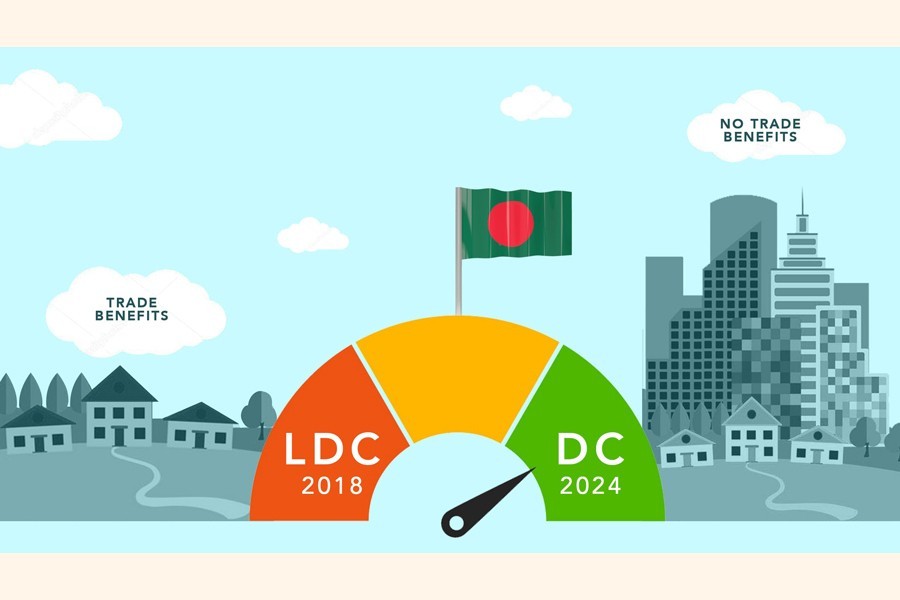Economists and businesses have suggested measures like diversification of products, technological upgradation and bilateral engagements with major export destinations to face post-graduation challenges.
They have also called for innovation, skills development, higher productivity and design development to cope with the changing market behaviour efficiently.
The graduation of Bangladesh from its least-developed country (LDC) status poses both opportunities for rebranding itself and challenges of losing trade preferences, according to them.
After 2026, the Bangladeshi-made goods will face 10-12 per cent duty, although the duty preference from the European Union will stay up to 2029 as a grace period.
The observations and recommendations were made at a session styled 'Bangladesh's LDC Graduation-Impediments and Way forward' at Dhaka Apparel Summit held at International Convention City Bashundhara on Wednesday.
The two-day summit began on Tuesday as part of the 'Made in Bangladesh Week 2022' co-hosted by Bangladesh Garment Manufacturers and Exporters Association (BGMEA), and Bangladesh Apparel Exchange.
BGMEA director Asif Ashraf moderated the session.
At the event, prime minister's principal secretary Dr Ahmad Kaikaus said, "There are challenges after post-graduation period but we can overcome those."
Te local ready-made garment (RMG) industry has proved that the sector can grow and sustain without basic raw materials and tariff benefit especially from the US.
RMG contributes only 7.0 per cent to the gross domestic product and manufacturing sectors 35 per cent, said Mr Kaikaus, adding that the country's strength is its domestic market.
ERD secretary Sharifa Khan said Bangladesh will enjoy existing duty benefit of the EU until 2029 and all LDCs requested the World Trade Organisation to extend LDC facilities for another six years.
"We can sustain but the global community should align their GSP programmes in line with the SDGs," she noted.
Ms Khan urged global apparel buyers and development partners to show generosity and not to put conditions one after another.
A total of 32 ILO conventions have to be ratified and implemented once the new EU GSP regulation comes into effect. It is 27 now, she cited.
Ms Khan also pleaded with buyers for maintaining ethical buying practices.
Bangladesh Ambassador to the Netherlands Riaz Hamidullah said industry should have four new principles-dignity rights, shared prosperity rights, transparency and responsibility rights, and harmonious industrial relations.
These are the key to becoming a middle-income country, he said, adding that the EU green deal, circular economy and net zero world are going to transform the industry.
Mr Hamidullah stressed the importance of technology, innovation and design to face the challenges.
BGMEA director Asif Ibrahim said LDC graduation has challenges as the country loses duty benefit in major markets, especially in the EU.
It enjoys duty-free access to 38 countries under GSP, including the UK and 27 EU countries, he stated.
Overall capability of the economy has to be improved, economic diversification, technological upgradation, skills development and institutional strengthening should be prioritised, he observed.
Foreign investment goes where there is an enabling environment that ensures advanced infrastructure, skilled human resources and political stability.
Mr Ibrahim also emphasised export competitiveness, both diversification of products and market.
Bangladesh has to play a proactive role in the regional and sub-regional initiatives such as BIMSTEC to be a part of comprehensive economic partnerships, he noted.
UNDP country economist Dr Nazneen Ahmed underpinned better planning to avoid a middle-income trap and also taking lessons how other countries overcome the issue. Countries having strong manufacturing base did not fall into the trap and Bangladesh has such a base.
She suggested enhancing productivity of mid-level management of garment industry, saying that the industry has made tremendous improvements in terms of compliance and productivity.
However, there needs more, she said.
Terming Bangladesh safest among H&M's 19 sourcing countries, the H&M regional country manager for production Bangladesh, Pakistan and Ethiopia, Ziaur Rahman, claimed that they practise ethical sourcing.
H&M sources 20 per cent of its total garments from Bangladesh. After graduation, these would face duty and so cost would rise.
Mr Rahman, however, recommended improving negotiating skills of local exporters to get better price.
He also committed that H&M would increase price once minimum wages are enhanced here.
Marks and Spencer Bangladesh country manager Shwapna Bhowmick underscored the need for investment and state policy support in man-made fibre-based garment manufacturing, saying that this has a huge demand.


